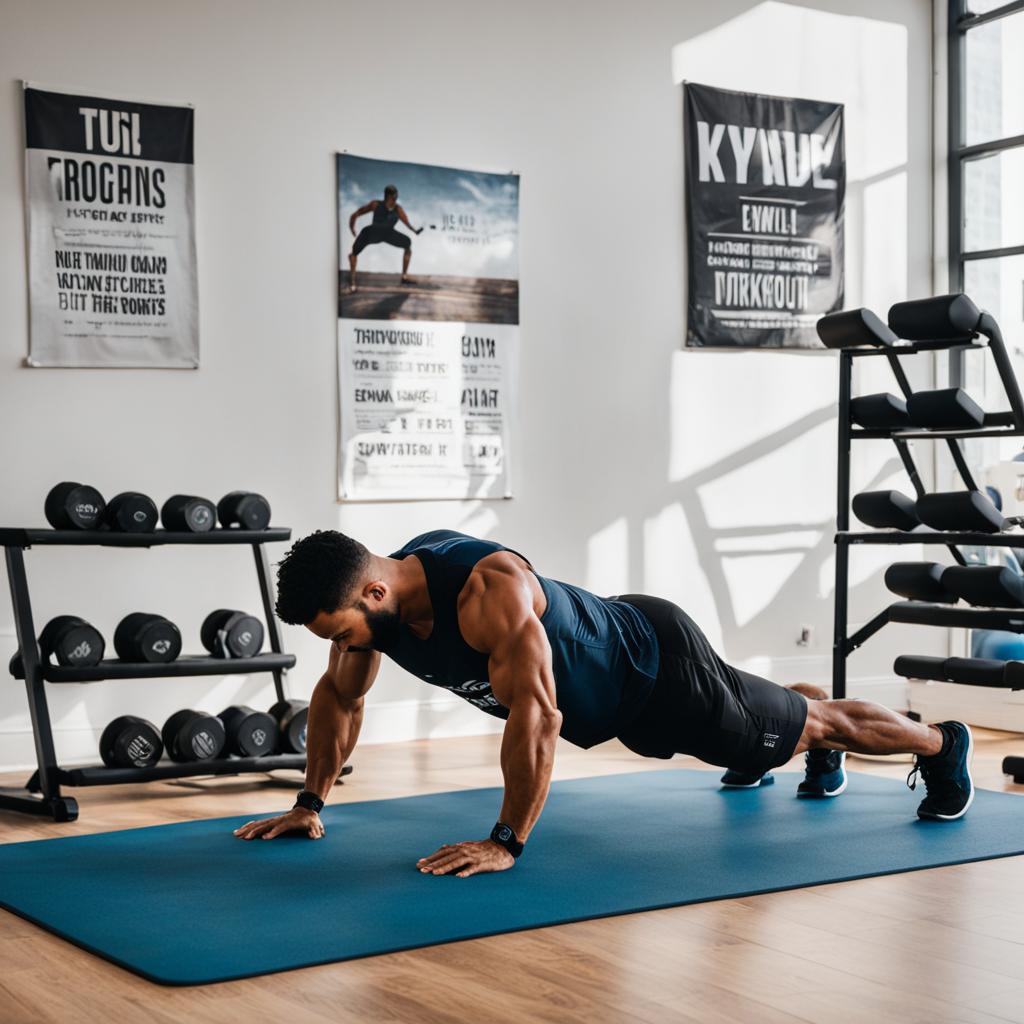
The Ultimate Guide to Effective Home Workouts
TABLE OF CONTENTS
In recent years, the way we think about fitness has undergone a transformation. The rise of home workouts, spurred on by the challenges of global events and the convenience of digital content, has made it easier than ever to stay fit without the need for a gym membership. If you’re ready to turn your living room into a personal training studio, this ultimate guide will provide you with the tools and tips you need to create an effective home workout environment.
1. Space Matters: Create Your Workout Zone
Before diving into workout routines, the first step is to designate a specific area in your living room for exercising. Ideally, this space should be clean, clutter-free, and conducive to movement. Here are some steps to create your workout zone:
Clear the area
Remove any furniture, decor, or items that may obstruct your movements. Aim for a space that allows you to perform a range of exercises with ease.
Add a workout mat
Invest in a durable exercise mat to create comfort and provide cushioning for floor workouts. This mat will also define your workout area visually.
Pay attention to lighting
Natural light can be uplifting and energizing, so try to position your workout zone near a window. If that’s not possible, ensure your space is well-lit with soft, warm lighting.
2. Essential Equipment: Make Your Living Room Gym-Ready
While many effective workouts can be performed with bodyweight exercises alone, incorporating some equipment can offer more variety and resistance. Here are some essentials to consider:
Resistance bands
These versatile bands add resistance to exercises like squats, lunges, and pushes. They’re easy to store and come in various strengths for different fitness levels.
Dumbbells
A set of dumbbells can enhance strength training in small spaces. A pair of light and heavy weights will allow you to perform a full range of exercises targeting different muscle groups.
Stability ball
This can be used for various core exercises and stretches. It’s also a fun way to engage your balance while watching TV!
Jump rope
An excellent tool for cardiovascular exercises, a jump rope can easily be stored away and offers a high-intensity workout in a small time frame.
Smart technology
Consider a fitness app or online streaming service that offers classes tailored to your preferences, from yoga to high-intensity interval training (HIIT).
3. Structuring Your Workouts: Effective Routines for Every Level
Whether you’re a beginner or a seasoned fitness enthusiast, it’s essential to structure your workouts effectively. Here’s a simple guide to help you plan:
Warm-Up (5-10 minutes)
Always start with a warm-up to prepare your body for exercise. Dynamic stretches, such as arm circles, leg swings, and gentle jogging in place will get your heart rate up.
Cardio (15-30 minutes)
Incorporate cardiovascular exercises to get your blood pumping. Some options include bodyweight HIIT circuits, dancing, or even following along with a jump rope routine.
Strength Training (20-30 minutes)
Use your dumbbells or resistance bands to target all major muscle groups. Consider circuits with exercises like:
- Squats or goblet squats
- Push-ups (regular or modified)
- Bent-over rows
- Plank variations
Flexibility and Cool Down (5-10 minutes)
Finish with static stretches to enhance flexibility and aid recovery. Focus on areas used during your workout, holding each stretch for at least 15-30 seconds.
4. Stay Motivated: Making It Fun and Engaging
Working out at home can sometimes feel solitary, but there are many ways to keep motivation high:
Set goals
Establish short-term, achievable goals, such as completing a certain number of workouts per week or mastering a difficult movement.
Fitness challenges
Create challenges for yourself or even invite friends and family to join in virtually. This adds a gamified element to your workouts.
Music and ambiance
Compile a workout playlist that energizes you or play a podcast while you exercise to turn the time into an enjoyable experience.
Visual inspirations
Hang inspirational quotes, progress pictures, or reminders of your fitness goals in your workout zone.
5. Consistency is Key: Making Home Workouts a Habit
Ultimately, the most effective home workouts stem from consistency. Here are some strategies to help make your fitness routine a lasting part of your life:
Schedule your workouts
Treat your home workouts like appointments on your calendar. Block out specific times each week dedicated to exercising.
Start small
If the idea of working out at home feels overwhelming, start with shorter sessions and gradually increase the duration as you become more comfortable.
Engage with a community
Join online fitness groups or forums where you can find support, share progress, and learn new routines.
Mix it up
Variety is the spice of life! Keep your workouts fresh and exciting by rotating routines, trying new classes, or switching up your equipment.
Conclusion
Transforming your living room into a fitness haven is not only feasible but can also be incredibly gratifying. With the right setup, equipment, and mindset, you can enjoy effective and motivational workouts right from the comfort of your home. Embrace the journey of home fitness, and you may find that it becomes an enjoyable, stress-relieving part of your daily routine. Happy exercising!
Home workout routines have surged in popularity over recent years, primarily due to their convenience and accessibility. As many individuals prioritized their health and wellness, the shift from gym-centric exercise to home workouts became a noteworthy trend. The beauty of working out at home lies in its flexibility; you can choose the time, type of exercise, and environment that best suits your lifestyle. This shift has enabled people to find innovative ways to stay active without the need for costly gym memberships or extensive equipment.
When establishing a home workout routine, it’s important to consider various factors, including your fitness goals, available space, and personal preferences. Setting clear goals can provide the necessary motivation and direction. Whether you’re looking to lose weight, build muscle, increase flexibility, or simply maintain a healthy lifestyle, having a specific aim will drive your commitment. Additionally, evaluating your available space can help you design a routine that fits comfortably within your home, whether it’s a dedicated workout room or just a small corner of your living room.
Bodyweight exercises often dominate home fitness routines because they require minimal to no equipment. Push-ups, squats, lunges, and planks can be performed easily and effectively within the confines of your home. These exercises not only help build strength and endurance but also promote flexibility and balance. Furthermore, they can be modified to suit different fitness levels, making them suitable for everyone from beginners to advanced exercisers. Incorporating a variety of bodyweight movements can help create a balanced routine that targets all major muscle groups.
For those looking to elevate their workouts, minimal equipment can substantially enhance the variety and intensity of your sessions. Resistance bands, dumbbells, or kettlebells are excellent additions that don’t require much space and can be easily stored. These tools allow for greater resistance training and help to develop muscle definition. Online platforms and video tutorials offer an abundance of exercises and routines that incorporate such equipment, making it easier for individuals to follow along and learn how to utilize these tools effectively.
Moreover, cardio workouts can seamlessly be integrated into home routines with little to no equipment. Activities such as jumping jacks, high knees, or dancing can get your heart rate up without the need for a treadmill or elliptical machine. For those who prefer structured workouts, many free and subscription-based apps and online classes offer comprehensive cardiovascular training options, from HIIT (High-Intensity Interval Training) to steady-state aerobics. These cardio routines are not only effective for burning calories but also boost mental health by releasing endorphins, which can alleviate stress and anxiety.
Additionally, flexibility and mobility workouts are vital components of a well-rounded fitness routine. Yoga and stretching exercises can enhance your overall performance and reduce the risk of injury. Many individuals find peace and relaxation through practicing yoga, which also serves as a counterbalance to more intense workout styles. Online video resources provide an array of yoga classes that cater to different skill levels and preferences, making it simpler for anyone to incorporate these practices into their weekly agenda.
Finally, maintaining consistency is crucial for the success of any home workout routine. Setting a schedule, creating a motivational environment, and tracking progress can significantly contribute to staying on course. Whether you prefer to exercise in the morning to start your day with vigor or at night to wind down, finding what works best for you is key. Moreover, joining online communities or workout groups can offer social support and accountability. As you immerse yourself in your home workout journey, remember that adaptability is vital—as your fitness level progresses, so should your routine. Embracing the evolution of your home workouts can lead to long-term success and a sustainable healthy lifestyle.






